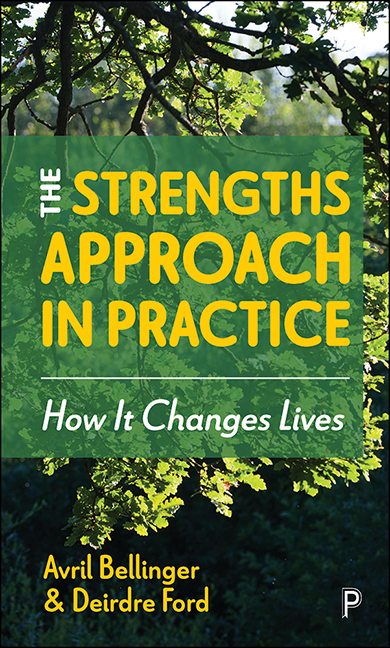Book contents
- Frontmatter
- Dedication
- Contents
- List of figures, tables and boxes
- About the authors
- Acknowledgements
- Preface
- Introduction: The strengths approach in a global emergency
- 1 A strengths approach to human need
- 2 A strengths approach to law and policy
- 3 A strengths approach to organisational development
- 4 A strengths approach to governance and management
- 5 A strengths approach to funding an NGO
- 6 A strengths approach to research
- 7 A strengths approach to student learning
- 8 A strengths approach to growing community
- 9 The strengths approach in practice: how it changes lives
- References
- Index
4 - A strengths approach to governance and management
Published online by Cambridge University Press: 15 September 2022
- Frontmatter
- Dedication
- Contents
- List of figures, tables and boxes
- About the authors
- Acknowledgements
- Preface
- Introduction: The strengths approach in a global emergency
- 1 A strengths approach to human need
- 2 A strengths approach to law and policy
- 3 A strengths approach to organisational development
- 4 A strengths approach to governance and management
- 5 A strengths approach to funding an NGO
- 6 A strengths approach to research
- 7 A strengths approach to student learning
- 8 A strengths approach to growing community
- 9 The strengths approach in practice: how it changes lives
- References
- Index
Summary
Under conditions of true complexity – where the knowledge required exceeds that of any individual and unpredictability reigns – efforts to dictate every step from the centre will fail. People need room to act and adapt. Yet they cannot succeed as isolated individuals, either – that is anarchy. Instead they require a seemingly contradictory mix of freedom and expectation – expectation to coordinate, for example, and also to measure progress towards common goals.
Gawande (2010: 79)A strengths approach to governance and management is a philosophical core providing an anchor in stormy seas. The strengths approach has enabled our own organisation to be responsive to constant changes in circumstances and to be nimble-footed while retaining financial probity, policy compliance and quality assurance, as well as remaining true to its values. The approach described by Atul Gawande as essential is difficult, but it is possible to sustain. In our view, there are three preconditions:
• trust that everyone in the organisation will do the best they can to deliver the shared goals;
• respect for different specialist knowledge and attention to detail;
• constant communication between team members to ensure that they all own strategic decisions.
These features underpin a strengths approach to governance and management based on mutual respect, shared goals and a system of supervision that encourages everyone to contribute. Responsibility is shared collectively but individual accountability is never abdicated.
In this chapter we review the neoliberal context for practice and specifically the influence of NPM. We discuss the elements that are part of a systemic strengths approach to management and governance, namely non-hierarchical structures, leadership and supervision. This is followed by a detailed examination of the way electronic systems, as an instrument of NPM, can undermine an organisation's core practices and how the strengths approach can be applied in mitigation.
The political context
Neo-liberalism concerns itself with markets and profits rather than social justice and human rights; with individualism rather than the promotion of community and citizenship.
Bellinger et al (2016: 204)The current climate for many western democracies has been explored extensively by political analysts and commentators.
- Type
- Chapter
- Information
- The Strengths Approach in PracticeHow It Changes Lives, pp. 77 - 101Publisher: Bristol University PressPrint publication year: 2022



